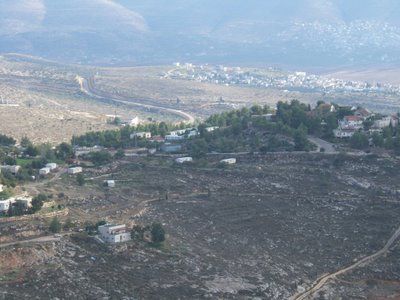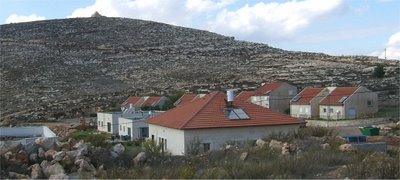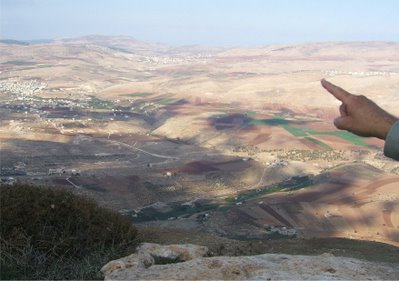Jacob is none too happy with their actions, and this is seen by many as the reason that he assigned their descendants a relatively small inheritance in the land of Israel when compared with the other ten tribes.

Later, the brothers sell their youngest brother, Yosef (Joseph) into slavery here. This betrayal, despite the noblest of motives, set into motion a series of events which resulted in 210 years of Jewish slavery in Egypt.
Elon Moreh, with the Arab village of Chatab in the Background
Later, when the Jewish people returned from Egypt, united under Yehoshua (Joshua,) they came to Mount Gerizim and Mount Ebal to reaffirm the covenant with Hashem (God.) It was a symbolic tikkun (repair) of the sin of the brotherly betrayal and discord between Joseph and his brothers, demonstrating the brotherly love between the twelve tribes of Israel before setting out to conquer the land.

A recently completed neighborhood in Elon Moreh.
After several centuries, the tribes of Israel united under King David, and later under his son, King Solomon. This was considered high tide of Jewish history, when the Jewish people were their closest to fulfilling our role on the world. From this point forward, however, we begin to slip as a people. After the death of King Solomon, the kingdom split into the northern ten tribes and the southern two. This split ocurred around 980 BCE.

A mikvah (Jewish Ritual Bath) on Har Kabir, the remains of ancient Jewish habitation of this area.
The northern ten tribes were ruled by a series of kings, the worst of whom re-wrote certain sections of the Torah, and some even erased God's name completely. They called themselves "Israel." The southern two tribes became the kingom of "Judah."
Judaism's holiest city, Jerusalem, was controlled by the southern two tribes. The Kingdom of Israel therefore relocated the capital city in Tirtzah, which is located just a few miles north of Elon Moreh.
 Sasha points to the Tirtzah Valley
Sasha points to the Tirtzah Valley The modern-day town of Tirtzah (Arab controlled)
The modern-day town of Tirtzah (Arab controlled)
Eventually, the northern tribes of Israel were conquered by the invading Assyrians, who exiled them to the four corners of the earth. Having weakened their connections to Torah, they were in no condition to withstand the rigors and temptations of life outside of the land of Israel, and they disappeared from history, becoming the ten lost tribes.
The southern Kingdom of Judea survived another 134 years, until that kingdom was also defeated, taken captive, and dragged into exile. But the Judeans had not strayed from Torah observance and, in what was a historical revolution for the era, they did not simply abandon their God or assimilate into the host culture after their defeat, but held fast to the commandments and survived as a people. Today, the overwhelming majority of the people who still follow the Torah are descendants of exiles from the Judean Kingdom, which is where we get our name. Jews.
New neighborhoods in Elon Moreh.
 The Grave on Mount Kabir
The Grave on Mount KabirPilgrims arriving in Elon Moreh


No comments:
Post a Comment